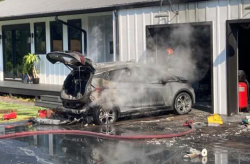
— A Chevy Bolt class action lawsuit alleges the 2020-2022 Bolt EV and 2022 Bolt EUV are unsafe to drive due to a risk of fires from the batteries.
The General Motors Bolt class action lawsuit includes:
“All persons who purchased the Class Vehicles in the United States or, alternatively, the State of California, for personal use and not for resale during the time period of four years prior to the filing of the complaint through the date of the court’s approval of the class certification motion.”
The Chevy Bolts are allegedly not fit for normal use because the batteries may catch fire when the cars are fully charged or if they fall below 70 miles of remaining range.
The plaintiff says customers cannot park their cars indoor overnight because of a risk of battery fires, and the class action alleges GM "has done nothing to remedy this issue. Simply put, Defendant is prioritizing profits over the health and safety of consumers."
California plaintiff David Kennedy leased a 2022 Chevrolet Bolt EV in July 2021 for $31,995, paying a down payment of $6,000 and monthly lease payments of $271.65. The monthly lease payments will continue for 35 months.
The plaintiff says he entered the lease agreement under the assumption he would be able to safely store and operate the Bolt based on the advertised battery and mileage capacity.
About a month after he leased the Bolt, GM announced a Chevy Bolt recall because the batteries could catch fire when nearing a full charge. The plaintiff says he was told to limit the battery charge to 90% and to not let the remaining range drop lower than 70 miles.
The Chevy Bolt class action lawsuit also says the plaintiff was warned not to park the car indoors overnight due to a risk of a battery fire.
According to the lawsuit, the plaintiff thought he was leasing a safe vehicle that would be environmentally friendly and instead he can't even charge the battery to full capacity.
"Defendant’s warning that consumers should not charge the Vehicles past 90% drops the advertised mileage capacity from 259 to 233.10 miles. Taking into consideration that consumers cannot allow the miles remaining on the Vehicle to fall below 70 miles, the battery range falls further to 163.10 miles – that is, 62.97% of the advertised mileage." — Chevrolet Bolt class action lawsuit
The lawsuit alleges the plaintiff has been forced to make "unforeseen accommodations and take precautions that interfere" with his normal and expected use of the Chevy Bolt.
The Bolt class action further alleges the plaintiff has suffered constant anxiety and has lost sleep due to the risk of a battery fire that could destroy his Chevy Bolt. Additionally, the plaintiff argues he would not have leased the Bolt if he would have known it had serious defects that can cause fires.
As part of the Chevy Bolt recall, GM will replace the batteries once replacement batteries are available.
The Chevy Bolt class action lawsuit was filed in the U.S. District Court for the Northern District of California: David Kennedy, v. General Motors Company, et al.
The plaintiff is represented by the Clarkson Law Firm, P.C.
CarComplaints.com has more details related to actions over the Chevy Bolt battery fires.
- Chevy Bolt Recall Update: Maximum Charge Reduced to 80%
- Chevy Bolt Recall Fix Will Cost $2 Billion
- Chevy Bolt Recall Update: New Parking Directions
- All 2017-2022 Chevy Bolts Recalled Over Battery Fires
- Chevrolet Bolt Class Action Lawsuit Says Battery Defective
- Chevy Bolt Battery Recall Too Late, Alleges Lawsuit
- Chevy Bolt Fire Recall Decreases Battery Range: Lawsuit
- Chevy Bolt Class Action Lawsuit Filed Over Range
- Chevy Bolt Fire Hazard Warning: Park Outside
- Chevy Bolt Fire Recall Issued After Repairs Failed
- Chevy Bolt Recall Fix Announced




